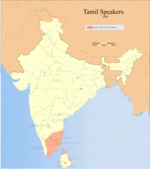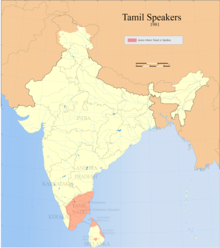
The Dravida Munnetra Kazhagam is an Indian political party based in the state of Tamil Nadu, where it is currently the ruling party, and the union territory of Puducherry, where it is currently the main opposition.

Muthuvel Karunanidhi was an Indian writer and politician who served as Chief Minister of Tamil Nadu for almost two decades over five terms between 1969 and 2011. He is popularly referred to as Kalaignar (Artist) and Mutthamizh Arignar for his contributions to Tamil literature. He had the longest intermittent tenure as Chief Minister of Tamil Nadu with 6,863 days in office. He was also a long-standing leader of the Dravidian movement and ten-time president of the Dravida Munnetra Kazhagam political party. Karunanidhi has the record of never losing an election to the Tamil Nadu Assembly, having won 13 times since his first victory in 1957. Before entering politics, he worked in the Tamil film industry as a screenwriter. He also made contributions to Tamil literature, having written stories, plays, novels, and a multiple-volume memoir. Karunanidhi died on 7 August 2018 at Kauvery Hospital in Chennai after a series of prolonged, age-related illnesses.
Thamizhaga Munnetra Munnani (1988-1989) was a short-lived political party found by veteran Tamil film actor Sivaji Ganesan in the year 1988. Sivaji Ganesan had a long running relation with many political parties, with his first movie itself being a propaganda movie of Dravida Munnetra Kazhagam.This party also contested on ladder symbol in 1989 election.

Vaiyapuri Gopalsamy, better known as Vaiko, is an Indian politician. He is a member of the Rajya Sabha, the upper house of the Parliament of India from Tamil Nadu. He is the founder and General Secretary of the Marumalarchi Dravida Munnetra Kazhagam (MDMK), a political party active mainly in the Indian state of Tamil Nadu. He was earlier elected to the Lok Sabha, the lower house of the Parliament of India from Sivakasi, Tamil Nadu.

Dravidar Kazhagam is a social movement founded by E. V. Ramasami, also called Thanthai Periyar. Its original goals were to eradicate the ills of the existing caste system including untouchability and on a grander scale to obtain a "Dravida Nadu" from the Madras Presidency. Dravidar Kazhagam would in turn give birth to many other political parties, including Dravida Munnetra Kazhagam and later the All India Anna Dravida Munnetra Kazhagam.
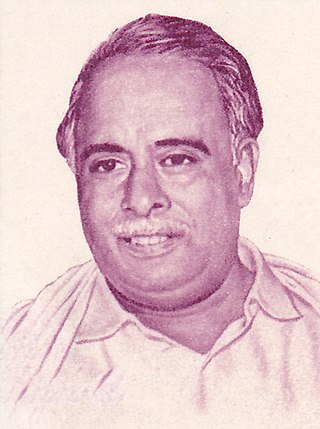
Conjeevaram Natarajan Annadurai, popularly known as Anna, also known as Perarignar Anna, was an Indian politician who served as the fourth and last Chief Minister of Madras State from 1967 until 1969 and first Chief Minister of Tamil Nadu for 20 days before his death. He was the first member of a Dravidian party to hold either post.

Viduthalai Chiruthaigal Katchi formerly known as the Dalit Panthers of India or the Dalit Panthers Iyyakkam is an Indian social movement and political party that seeks to combat caste based discrimination, active in the state of Tamil Nadu. The party also has a strong emphasis on Tamil nationalism. Its chairman is Thol. Thirumavalavan, a lawyer from Chennai and its general secretary is the writer Ravikumar.
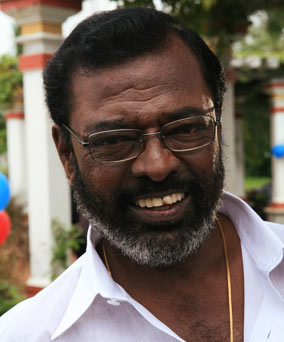
S.S. Manivannan, better known by his mononym Manivannan, was an Indian film director, actor and activist who worked in Tamil cinema. In a career spanning three decades, he went from being a story and dialogue writer for director Bharathiraja from 1980–82 to a successful director who thrived in experimenting with different genres, before becoming an actor. With over 400 films to his name, Manivannan was one of the most experienced actors in the field and directed exactly 50 films. Manivannan was mainly a supporting actor in films and often played the comedian, supporting character and villainous roles.
Dravidian nationalism, or Dravidianism, developed in Madras Presidency which comprises the four major ethno-linguistic groups in South India. This idea was popularized during the 1930s to 1950s by a series of widespread and popular movements and organizations that contended that the South Indians formed a racial and a cultural entity that was different from the North Indians. Dravidianists argue that the Brahmins and other upper castes were originally Aryan migrants from outside of India, and that they imposed their language, Sanskrit, religion and heritage on the Dravidian people. The claim is based on widespread evidence of the genetic differences between North and South Indians, the linguistic differences between the two regions, and the fact that Indo Aryan Languages share a common ancestor with European languages such as English and likely originated outside of India. The hypothesis has ancient origins based on Sangam literature and the concept of Tamilakam but was codified in its modern form by E. V. Ramasami Periyar. The theory is contested by supporters of Hindutva who see it as a threat to Hindu essentialism.
Dravida Nadu is the name of a proposed sovereign state demanded by the Justice Party led by the founder of the self-respect movement, E.V. Ramasamy Periyar, and the Dravida Munnetra Kazhagam (DMK) led by C. N. Annadurai for the speakers of the Dravidian languages in South India.
Politics of Tamil Nadu is the politics related to the Indian state of Tamil Nadu.
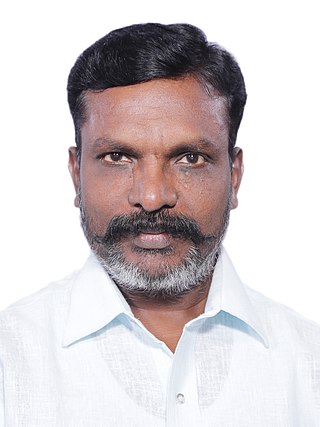
Tholkappiyan Thirumavalavan, better known as Thol. Thirumavalavan is a political leader, scholar and activist from the southern Indian state of Tamil Nadu. He is a Member of Parliament from Chidambaram. Leader and President of Viduthalai Chiruthaigal Katchi. He rose to prominence in the 1990s as a bahujan leader, and formally entered politics in 1999. His political platform centres on ending caste-based discrimination and consequently the caste system. He has also expressed support for Tamil nationalist movements in Sri Lanka.
Dravidian parties include an array of regional political parties in the state of Tamil Nadu, India, which trace their origins and ideologies either directly or indirectly to the Justice Party and the Dravidian movement of C. Natesanar and Periyar E. V. Ramasamy. The Dravidian movement was based on the linguistic divide in India, where most of the Northern Indian, Eastern Indian and Western Indian languages are classified as Indo-Aryan, whereas the South Indian languages are classified as Dravidian. Dravidian politics has developed by associating itself to the Dravidian community. The original goal of Dravidian politics was to achieve social equality, but it later championed the cause of ending the domination of North India over the politics and economy of the South Indian province known as Madras Presidency.

Erode Venkatappa Ramasamy, revered by his followers as Periyar or Thanthai Periyar, was an Indian social activist and politician who started the Self-Respect Movement and Dravidar Kazhagam. He is known as the 'Father of the Dravidian movement'. He rebelled against Brahmin dominance and gender and caste inequality in Tamil Nadu. Since 2021, the Indian state of Tamil Nadu celebrates his birth anniversary as 'Social Justice Day'.
Dravidian parties rose to power and prominence in the political stage of Tamil Nadu, a state in India, in the 1960s. The rise in power and political support was gradual until Dravida Munnetra Kazhagam (DMK), a Dravidian party, formed the government in the state in 1967. Although since the 1970s the Dravidian parties have met with many break-aways and have taken rival stances against each other, the seat of power in Tamil Nadu has been with one or another Dravidian party. The increase in popularity of the Dravidian parties in the 1960s is attributed to several factors, including the fall of popularity of the Congress Government in the centre and the north–south disparity, as claimed by the Dravidian politics. The series of events climaxed with anti-Hindi agitation which led to the downfall of popularity of the then Indian National Congress government in the state and the eventual rise of Dravidian parties to power.
S. Natarajan Udayar was an Indian politician and 3 time DMK MLA from Thanjavur Constituency. A close friend and supporter of Periyar E.V. Ramaswamy, he was an early member of Dravidar Kazhagam. His association with Aringar C N Annadurai made him part ways with E.V.R. politically and join Dravida Munnetra Kazhagam (DMK) as one of the earliest and founding members of DMK.
The Tamil Eelam Supporters Organization (TESO) was an Eelam Tamil supporters organisation founded in 1985 with Dr. Kalaignar Karunanidhi as president and K. Veeramani and Nedumaran as members for the establishment of an independent Tamil Eelam in the northeast of Sri Lanka.

Naam Tamilar Katchi is a Tamil nationalist party in the Indian state of Tamil Nadu.

The 2013 Anti–Sri Lanka protests are a series of student protests and agitations initiated by the Students Federation for Freedom of Tamil Eelam in Tamil Nadu, India, against war crimes committed against Sri Lankan Tamil people by Sri Lankan army during the Eelam War IV. The protesters demanded that the Government of India vote in support of a United Nations Human Rights Council (UNHRC) resolution censuring the Government of Sri Lanka for war crimes. Some radical groups even demanded the prosecution of the President of Sri Lanka, Mahinda Rajapakse for his role in the alleged genocide of Sri Lankan Tamils. Apart from college students, doctors, film personalities and employees of IT companies also participated in the protests.
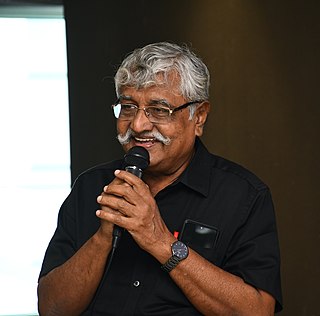
Subbaiah Veerapandian, known popularly as Suba Veerapandian or Subavee, is an Indian political activist, author, orator, former Tamil-language professor and former film artist. Since 2007, he has been serving as the general secretary of the Dravida Iyyakka Tamilar Peravai, a Tamil Nadu-based political organisation that aims to promote Ambedkarite, Dravidian and Marxist ideals in the State and elsewhere.
